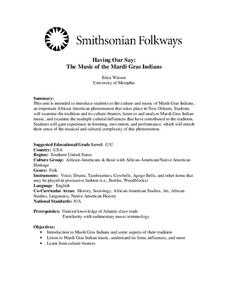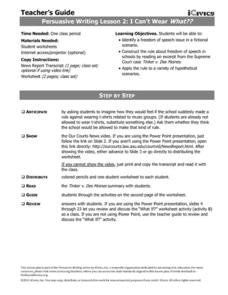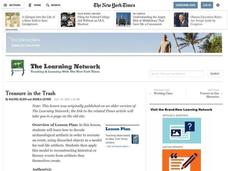Academy of American Poets
Teach This Poem: “As I Walk These Broad Majestic Days” by Walt Whitman
Walt Whitman's poem "As I Walk These Broad Majestic Days" offers scholars an opportunity to practice their noticing skills. They first examine a postcard of the Newport News Shipyard listing things they notice about the image and how...
Smithsonian Institution
The Music of the Mardi Gras Indians
The traditions, costumes, and the music of the Mardi Gras Indians, African-Americans and those with African American or Native American Heritage are the focus of a unit that introduces class members to a little-known group that...
Alabama Department of Archives and History
An African American Represents Alabama during Reconstruction
The era after the Civil War saw a flourishing of African Americans exercising their rights. Using graphic organizers and Internet research, pupils consider the legacy of Benjamin Sterling Turner, who sat in Congress. Afterward, they...
Curated OER
Civil War Time Line
Students draw a time line on graph paper on a scale of one square to every five years beginning in 1770 and ending at 2000. They place historic events and inventions in their correct time period on the time line, and add their birthday...
Stanford University
Beyond Vietnam
On April 4, 1967 Martin Luther King, Jr. delivered his speech "Beyond Vietnam." The controversy that followed is the focus of a three-lesson unit that asks class members to consider the political and social implications of King's...
Stanford University
Martin Luther King, Jr. and Malcolm X: A Common Solution?
Much has been made of the differences between Martin Luther King, Jr. and Malcolm X. But was there any common ground between them? Class members reconsider what they think they know about these two civil rights leaders with...
iCivics
I Can’t Wear What?
Can schools ban t-shirts picturing musical groups or bands? Your young citizens will find out with this resource, which includes a summary of a United States Supreme Court case from the 1960s about a similar dispute over young scholars...
PBS
History of Juneteenth and Why It’s Now a National Holiday
June 19 is now a United States federal holiday. Young historians examine the background of the first Juneteenth celebrations and why on June 15, 2021, Congress finally approved "Juneteenth National Independence Day" as a federal holiday.
Curated OER
Exploration of Civil War Webquest
Students use the internet to research what life was like for Confederate and Union soldiers in a specific battle of interest to them. In groups, they complete a webquest on the battle in which one represents a Confederate soldier and the...
Curated OER
Was There an Industial Revolution? Americans at Work Before the Civil War
High schoolers tabulate the First Industrial Revolution where a significant number of inventions and innovations appeared transforming American life. Cite examples of change (ex. telegraph) in the lives of Americans during the era of...
Curated OER
Backward Lesson Plan
Students explore and analyze the position of freedmen in the post Civil War period as well as the impact of Andrew Johnson's presidency on Reconstruction. In addition, they evaluate the laws and amendments that were put in place during...
Curated OER
Gettysburg Movie
Students create a movie that includes both sound and pictures of the Gettysburg Address using iMovie, digital cameras, and copies of the Gettysburg Address. Extensive examples of student works are given.
Curated OER
Breaking the Chains: Rising Out of Circumstances
Study history through photographs. In this visual arts and history lesson plan, learners learn to analyze photographs to discover details about life during the Civil War era. Students write journal entries as if they are the...
Curated OER
The Changing Meaning of "Due Process"
Middle schoolers examine the United States Constitution and how the application for due process differs in two amendments. They research the changing definition of the term since the Civil War. They use the internet to research press...
Center for History and New Media
The Impact of the Jim Crow Era on Education, 1877–1930s
Even though American slaves were officially emancipated in 1865, the effects of slavery perpetuated throughout the 19th and 20th centuries. Middle and high schoolers learn about the ways that discrimination and the Jim Crow laws...
Curated OER
Picture Lincoln
Students analyze Alexander Gardner's photograph of Abraham Lincoln and complete related activities. In this Abraham Lincoln instructional activity, students describe Abraham Lincoln as he is presented in Gardner's photograph. Students...
Curated OER
Chapter 8: Reconstruction
In this Reconstruction worksheet, high schoolers read assigned textbook pages regarding Reconstruction plans and respond to 44 short answer questions.
Curated OER
Women's Roles in Post World War II
Students discuss the role of women before, during, and after World War II. For this equality lesson, students plan how to make the workforce more equal among men and women after World War II. They research World War II and its effects on...
Curated OER
Treasure in the Trash
Students decode archaeological artifacts in order to recreate an event, using discarded objects as a model for real-life artifacts. They apply this model to reconstructing historical or literary events from artifacts they create.
Curated OER
Historical Scavenger Hunts
Students investigate the impact of historical events. In this historical scavenger hunt lesson, students examine photographs of a local monument that zoom in on details. Students record their impressions regarding the photos. Students...
National First Ladies' Library
The Debate on Slavery
Young historians research the debate over slavery; some young scholars take the pro-slavery side and others the anti-slavery side. They take the role of a character such as a plantation owner, a legislator, a free Black, a slave, or a...
Curated OER
Art -- The Secret to Freedom
Fourth graders create a coded message in a quilt. In this art activity students demonstrate the communication used by the Underground Railroad. Students work in a group to make a quilt with a code in it.
Curated OER
Understanding Reconstruction in South Carolina
Eighth graders interpret historical evidence presented in primary and secondary resources. In this Reconstruction lesson, 8th graders research the role of Reconstruction in South Carolina by simulating the environment of East Bay Street...
Curated OER
Chapter 21 - The Cold War to 1960
In this U.S. history worksheet, students read assigned textbook pages regarding the Cold War 1950's America and respond to 50 short answer questions.

























